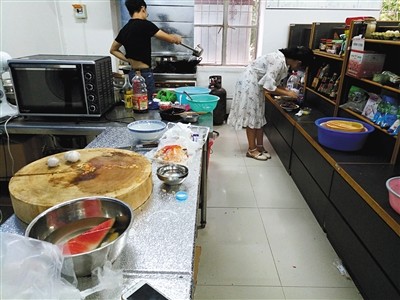‘Shared-kitchen’ a hit at Hubei University
|
|
|
Students cook in the shared-kitchen at Hubei University. [Photo/the Beijing News] |
Hubei University students desperate for a taste of home cooking have set up their own shared-kitchen on campus, the Beijing News reports.
The facility was the brain child of Yang Haibei, a senior student, who yearned for the cuisine of his hometown, so invested 20,000 yuan (USD 3000) in May this year to buy cooking utensils and materials.
“I missed the flavors of my hometown Tangshan, but there was no such food in the school canteen. After chatting with my hometown friends, I had the idea of running a shared kitchen at the college,” said Yang.
|
|
|
Yang Haibei, the senior student who started the shared-kitchen at Hubei University. [Photo/the Beijing News] |
At the moment, the kitchen is open to students attending all the universities in the city of Wuhan. Users have to book ahead, prepare their own vegetables, and pay 10 yuan (USD 1.50) to use the kitchen to cook their own food, which just about covers the running costs. Recently there’s been a surge in the numbers using the facility, although it is still operating at a loss.
Yang Haibei has now been joined by two business partners who help with the management and promotion of the service.
The students use the sharing kitchen especially when celebrating birthdays, couples have dates, or roommates have parties.
“Students love cooking crawfish the most. One portion of crawfish in the market in Wuhan is over 200 yuan, but it only costs 60 yuan to buy uncooked crawfish, and then 10 yuan to use the kitchen to make the dish themselves,” said Yang Haibei.
“The kitchen works well. Most students don’t know how to cook and the kitchen provides students with an opportunity to experience cooking,” Yang added.
Yang is planning to take his shared-kitchen idea to other universities in Wuhan, and is now in discussions with relevant departments.
Yang says young people should show the spirit of innovation and keep up with the times. He says it’s been a great experience so far, and that he’s learned a lot in the process.


